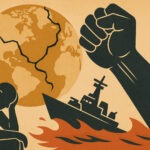“We hear war called murder. It is not; it is suicide.”
James Ramsay MacDonald
James Ramsay MacDonald
James Ramsay MacDonald was a prominent British statesman and the first Labour Prime Minister of the United Kingdom. Born in 1866, MacDonald played a crucial role in the early 20th century, advocating for social reforms and peace. His tenure as Prime Minister saw significant efforts towards disarmament and international cooperation, reflecting his deep commitment to preventing war and promoting diplomacy.
Analysis of the Quote in the Context of International Relations
“We hear war called murder. It is not; it is suicide.” This poignant quote by James Ramsay MacDonald succinctly captures the self-destructive nature of war.
From a game-theory perspective, engaging in war can be strategically analyzed as a move that often leads to mutually assured destruction, depleting resources and causing significant harm to all parties involved.
Game Theory in international relations examines strategic interactions where the outcomes depend on the actions of all players involved. In the context of war, this theory helps explain why armed conflict is often a lose-lose scenario, despite what individual states might hope to achieve through military means.
The Prisoner’s Dilemma, a fundamental concept in game theory, illustrates how two rational actors might not cooperate, even if it appears that cooperation would be in their best interest. Applied to war, states may choose to engage in conflict (defect) rather than seek peaceful solutions (cooperate) due to mistrust and the fear that the other side might not adhere to peaceful agreements. However, this often results in both sides suffering greater losses than if they had cooperated.
Historical Examples
One historical example is World War I, where the major powers of Europe, locked in a web of alliances and mutual distrust, chose to engage in a devastating conflict rather than seeking diplomatic solutions. The war resulted in unprecedented casualties, economic hardship, and political upheaval, demonstrating the self-destructive nature of such large-scale conflicts. Each nation’s decision to go to war, influenced by the fear of others gaining a strategic advantage, ultimately led to mutual destruction.
Resource Depletion and Economic Impact
From a game-theory perspective, war depletes resources and weakens the economic stability of the involved nations. The costs of war extend beyond immediate military expenditures to long-term economic consequences, such as rebuilding infrastructure, addressing the needs of displaced populations, and managing post-war economic instability. These factors illustrate how war, akin to suicide, damages not only the targeted state but also the aggressor.
Modern Implications
In today’s interconnected world, the stakes are even higher. Nuclear proliferation, for instance, amplifies the risk of total annihilation, making the strategic consideration of war as a suicidal act even more pertinent. Countries like the United States and Russia, with vast nuclear arsenals, must navigate this delicate balance, understanding that a nuclear war would be catastrophic for all parties involved.
Additionally, contemporary conflicts such as the prolonged war in Afghanistan highlight how sustained military engagements drain national resources and result in significant human and economic costs. These examples reinforce MacDonald’s assertion that war, viewed through the lens of game theory, is a strategically poor decision, often leading to self-inflicted harm.
In conclusion, James Ramsay MacDonald’s quote underscores the strategic folly of war from a game-theory perspective. War often results in mutual destruction, depleting resources and causing extensive harm to all involved. By recognizing the self-destructive nature of war, states can better appreciate the value of diplomacy and cooperation in maintaining global peace and stability.
References by ChatGPT:
Axelrod, R. (1984). The Evolution of Cooperation. Basic Books.
Fearon, J. D. (1995). Rationalist Explanations for War. International Organization, 49(3), 379-414.
Human References:
- ChatGPT. (n.d.). OpenAI. https://chat.openai.com/#
- Game Theory – Econlib. (2018, 27 junio). Econlib. https://www.econlib.org/library/Enc/GameTheory.html
- History of James Ramsay MacDonald – GOV.UK. (s. f.). https://www.gov.uk/government/history/past-prime-ministers/james-ramsay-macdonald









No responses yet